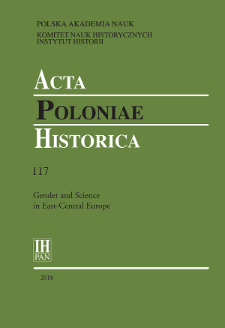
Object
Title: Love of Wide Open Waters : the Polish Maritime Programme according to the Baltic and Western Institutes in the Aftermath of the Second World War (1945–ca. 1950)
Subtitle:
Acta Poloniae Historica T. 117 (2018)
Contributor:
Institute of History of the Polish Academy of Sciences ; Polish National Historical Committee ; Hartzell, James : Ed.
Publisher:
Instytut Historii im. Tadeusza Manteuffla Polskiej Akademii Nauk
Place of publishing:
Description:
Type of object:
Abstract:
This article analyses the Polish maritime programme after the Second World War, as expressed in scholarship of two main Polish research institutions: the Baltic Institute and the Western Institute. Given the considerable border changes at the end of the war, which incorporated a long coastline and three major ports on the Baltic Sea (Danzig/Gdańsk, Stettin/Szczecin and Gdynia) into post-war Poland, the maritime programmes gained a new basis for operations in comparison to the interwar period, and thus had to be adapted accordingly. They contained both continuities and modifications: in ideological terms they were based on the prewar premises of Poland’s origins as a Baltic Sea country, and had a strong anti-German dimension. On the other hand, they were more pragmatic and concentrated on the organization of the maritime economy and education. Similarly as in the interwar period, they were also seen as a modernizing project: the maritime economy and education were supposed to connect the Polish nation with the whole world, and thus assure its equal status as part of the Western world.
References:
Boduszyńska-Borowikowa Maria, Życie jak płomień. O życiu i pracach Józefa Borowika (Gdańsk, 1972).
Borowik Józef (ed.), Światopogląd morski (Toruń, 1934).
Ciesielski Czesław, ‘Z dziejów Instytutu Bałtyckiego’, in Czesław Ciesielski (ed.), Osiemdziesiąt lat Instytutu Bałtyckiego. Materiały konferencji naukowej z 29 listopada 2005 r. (Gdańsk, 2006), 7–17.
Górski Karol, Polska w zlewisku Bałtyku (Gdańsk, Bydgoszcz and Szczecin, 1947).
Grodek Andrzej et al. (eds.), Monografia Odry (Poznań, 1948).
Grzechnik Marta, ‘“Recovering” Territories: The use of history in the integration of the new Polish western borderland after World War II’, Europe-Asia Studies, lxix, 4 (2017), 668–92.
Kenney Padraic, Rebuilding Poland: Workers and Communists, 1945–1950 (Ithaca and London, 2012).
Konstantynów Dariusz and Małgorzata Omilanowska (eds.), Polska nad Bałtykiem: Konstruowanie identyfikacji kulturowej państwa nad morzem 1918–1939 (Gdańsk, 2012).
Labuda Gerard, Wielkie Pomorze w dziejach Polski (Poznań, 1947).
Perkowski Piotr, Gdańsk – miasto od nowa. Kształtowanie społeczeństwa i warunki bytowe w latach 1945–1970 (Gdańsk, 2013).
Potocki Stanisław, ‘The Baltic Institute and Scandinavian Studies in Poland’, Komunikaty Instytutu Bałtyckiego, xi, 20 (1974), 3–14.
Szczerski Andrzej, Modernizacje: sztuka i architektura w nowych państwach Europy Środkowo-Wschodniej 1918–1939 (Łódź, 2010).
Wojciechowski Zygmunt, Polska – Niemcy. Dziesięć wieków zmagania (Poznań, 1945).
Relation:
Volume:
Start page:
End page:
Detailed Resource Type:
Format:
Resource Identifier:
oai:rcin.org.pl:72201 ; 0001-6829 ; 2450-8462 ; 10.12775/APH.2018.117.07
Source:
IH PAN, sygn. A.295/117 Podr. ; IH PAN, sygn. A.296/117 ; click here to follow the link
Language:
Rights:
Creative Commons Attribution BY-ND 4.0 license
Terms of use:
Copyright-protected material. [CC BY-ND 4.0] May be used within the scope specified in Creative Commons Attribution BY-ND 4.0 license, full text available at: ; -
Digitizing institution:
Institute of History of the Polish Academy of Sciences
Original in:
Library of the Institute of History PAS
Projects co-financed by:
National Programme for the Development of the Humanities
Access:
Object collections:
- Digital Repository of Scientific Institutes > Partners' collections > Institute of History PAS > Serials
- Digital Repository of Scientific Institutes > Partners' collections > Institute of History PAS > Institute Publications
- Digital Repository of Scientific Institutes > Partners' collections > Institute of History PAS > Institute Publications > Journals
- Digital Repository of Scientific Institutes > Partners' collections > Institute of History PAS > Institute Publications > Journals > Acta Poloniae Historica
- Digital Repository of Scientific Institutes > Literature > Journals/Articles
Last modified:
Sep 22, 2023
In our library since:
Jun 4, 2019
Number of object content downloads / hits:
389
All available object's versions:
https://rcin.org.pl./publication/94644
Show description in RDF format:
Show description in RDFa format:
Show description in OAI-PMH format:
Objects Similar
Woźnica, Andrzej Józef
Wielopolski, Alfred (1905–1996)
Winiszewska-Ślipińska, Grażyna
Czechowska, Wiesława Radchenko, Alexander G. Czechowski, Wojciech
Radchenko, Alexander G. Czechowski, Wojciech Czechowska, Wiesława
Lipatow W., Aleksander Żukowska, Maria Helena Giebułtowski, Jerzy
Rolik, Halina Państwowe Wydawnictwo Naukowe (1951–1992) Polska Akademia Nauk. Instytut Zoologii

 INSTYTUT ARCHEOLOGII I ETNOLOGII POLSKIEJ AKADEMII NAUK
INSTYTUT ARCHEOLOGII I ETNOLOGII POLSKIEJ AKADEMII NAUK
 INSTYTUT BADAŃ LITERACKICH POLSKIEJ AKADEMII NAUK
INSTYTUT BADAŃ LITERACKICH POLSKIEJ AKADEMII NAUK
 INSTYTUT BADAWCZY LEŚNICTWA
INSTYTUT BADAWCZY LEŚNICTWA
 INSTYTUT BIOLOGII DOŚWIADCZALNEJ IM. MARCELEGO NENCKIEGO POLSKIEJ AKADEMII NAUK
INSTYTUT BIOLOGII DOŚWIADCZALNEJ IM. MARCELEGO NENCKIEGO POLSKIEJ AKADEMII NAUK
 INSTYTUT BIOLOGII SSAKÓW POLSKIEJ AKADEMII NAUK
INSTYTUT BIOLOGII SSAKÓW POLSKIEJ AKADEMII NAUK
 INSTYTUT CHEMII FIZYCZNEJ PAN
INSTYTUT CHEMII FIZYCZNEJ PAN
 INSTYTUT CHEMII ORGANICZNEJ PAN
INSTYTUT CHEMII ORGANICZNEJ PAN
 INSTYTUT FILOZOFII I SOCJOLOGII PAN
INSTYTUT FILOZOFII I SOCJOLOGII PAN
 INSTYTUT GEOGRAFII I PRZESTRZENNEGO ZAGOSPODAROWANIA PAN
INSTYTUT GEOGRAFII I PRZESTRZENNEGO ZAGOSPODAROWANIA PAN
 INSTYTUT HISTORII im. TADEUSZA MANTEUFFLA POLSKIEJ AKADEMII NAUK
INSTYTUT HISTORII im. TADEUSZA MANTEUFFLA POLSKIEJ AKADEMII NAUK
 INSTYTUT JĘZYKA POLSKIEGO POLSKIEJ AKADEMII NAUK
INSTYTUT JĘZYKA POLSKIEGO POLSKIEJ AKADEMII NAUK
 INSTYTUT MATEMATYCZNY PAN
INSTYTUT MATEMATYCZNY PAN
 INSTYTUT MEDYCYNY DOŚWIADCZALNEJ I KLINICZNEJ IM.MIROSŁAWA MOSSAKOWSKIEGO POLSKIEJ AKADEMII NAUK
INSTYTUT MEDYCYNY DOŚWIADCZALNEJ I KLINICZNEJ IM.MIROSŁAWA MOSSAKOWSKIEGO POLSKIEJ AKADEMII NAUK
 INSTYTUT PODSTAWOWYCH PROBLEMÓW TECHNIKI PAN
INSTYTUT PODSTAWOWYCH PROBLEMÓW TECHNIKI PAN
 INSTYTUT SLAWISTYKI PAN
INSTYTUT SLAWISTYKI PAN
 SIEĆ BADAWCZA ŁUKASIEWICZ - INSTYTUT TECHNOLOGII MATERIAŁÓW ELEKTRONICZNYCH
SIEĆ BADAWCZA ŁUKASIEWICZ - INSTYTUT TECHNOLOGII MATERIAŁÓW ELEKTRONICZNYCH
 MUZEUM I INSTYTUT ZOOLOGII POLSKIEJ AKADEMII NAUK
MUZEUM I INSTYTUT ZOOLOGII POLSKIEJ AKADEMII NAUK
 INSTYTUT BADAŃ SYSTEMOWYCH PAN
INSTYTUT BADAŃ SYSTEMOWYCH PAN
 INSTYTUT BOTANIKI IM. WŁADYSŁAWA SZAFERA POLSKIEJ AKADEMII NAUK
INSTYTUT BOTANIKI IM. WŁADYSŁAWA SZAFERA POLSKIEJ AKADEMII NAUK


































